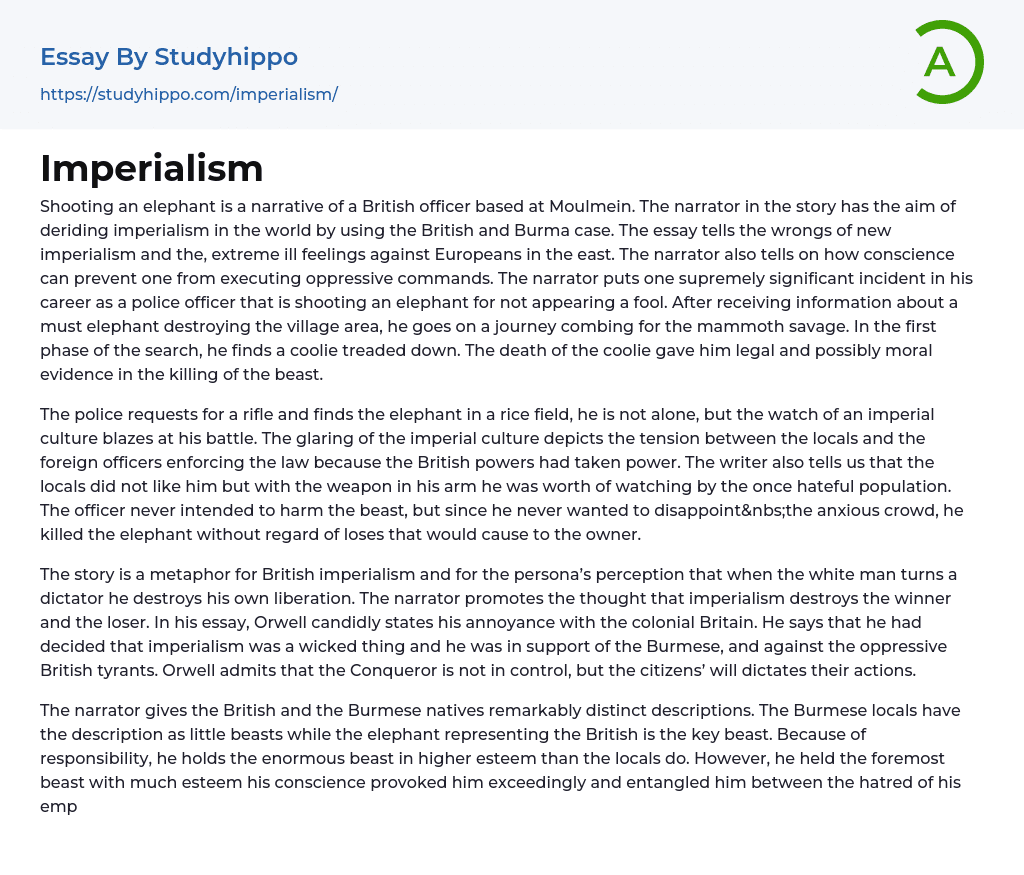"Shooting an Elephant" is a narrative about a British officer stationed at Moulmein who aims to criticize imperialism, specifically by highlighting the British and Burma situation. The essay explores the injustices of new imperialism and the intense hostility towards Europeans in the East. Additionally, the narrator reflects on how one's conscience can prevent them from carrying out oppressive orders. A pivotal moment in the narrator's career as a police officer is recounted, wherein he is forced to shoot an elephant to avoid appearing foolish. Upon receiving reports of an elephant causing destruction in a village, he embarks on a quest to find the massive creature. During the initial phase of the search, he discovers a coolie who was trampled to death, providing legal and potentially moral justification for taking down the beast.
The police officer requests a r
...ifle and discovers an elephant in a rice field. He is accompanied by the imposing presence of an imperial culture, which symbolizes the tension between the local population and the foreign officers enforcing British rule. Despite not being liked by the locals, the officer's armed status makes him worth watching. The officer never intended to harm the elephant but felt pressured to appease the anxious crowd, resulting in the elephant's death and potential loss for its owner. This story serves as a metaphor for British imperialism and highlights the narrator's belief that when a white man becomes a dictator, he destroys his own liberation. Orwell openly expresses his annoyance with colonial Britain in his essay, admitting that he considers imperialism to be wicked and aligns himself with the oppressed Burmese against their oppressive British rulers. The narrator emphasizes tha
it is ultimately the citizens' will that determines their actions, not the conqueror. The British and Burmese natives are described in starkly contrasting terms, with the Burmese being portrayed as little beasts while the elephant representing the British is depicted as a dominant beast. The officer holds a higher regard for the enormous beast due to his sense of responsibility, unlike the locals.However, he esteemed the foremost beast greatly and his conscience stirred within him causing a conflict between his hatred of imperialism and his anger towards the malevolent little creatures who made his job difficult. The story artfully utilizes literary elements to create a repulsive depiction of imperialism and its atrocities. The essay's message sensitizes readers to the destruction caused by oppressive governments. Through metaphorical means, the story helps readers understand how modern-day imperialism can be destructive for both the conquered and the conqueror. The theme of "shooting an elephant" serves as Orwell's vehement critique of imperialism and its evils, focusing on his own experiences while working in Burma under British rule. All the utilized elements serve to reinforce the central theme by incorporating relevant details. The plot, atmosphere, and conflict all revolve around the narrator's theme. The arrangement of the plot generates suspense and effectively conveys ideas. The atmosphere in the story is filled with animosity as the Burmese detested their British invaders, while the police officials harbored resentment towards the Burmese people. Although Orwell did not share the same disdain for the Burmese, he despised his job and empathized with the people. The story is highly credible as it is narrated from a first-person point of view.The presence of elephants in Burma,
which are commonly used for transportation and other purposes, adds credibility and coherence to the essay by making the symbolism of elephants highly relevant in its context.
- Cuban Missile Crisis essays
- Fidel Castro essays
- French Revolution essays
- Han Dynasty essays
- Hiroshima essays
- Imperialism essays
- Jack The Ripper essays
- Mao Zedong essays
- Middle Ages essays
- Mongols essays
- Nelson Mandela essays
- Ottoman Empire essays
- Reformation essays
- Reign of Terror essays
- Renaissance essays
- Roaring Twenties essays
- Romanticism essays
- Samurai essays
- Scientific Revolution essays
- Soviet Union essays
- 1984 essays
- A Farewell to Arms essays
- A Good Man Is Hard to Find essays
- A Hanging essays
- A Lesson Before Dying essays
- A Long Way Gone essays
- A Rose For Emily essays
- A Separate Peace essays
- A Tale Of Two Cities essays
- A Very Old Man With Enormous Wings essays
- Adventures Of Huckleberry Finn essays
- Alice in Wonderland essays
- All Quiet on The Western Front essays
- Allegory of the Cave essays
- An occurrence at owl creek bridge essays
- Animal Farm essays
- Anthem essays
- Antigone essays
- Arthur Conan Doyle essays
- As I Lay Dying essays
- Atticus Finch essays
- Barn Burning essays
- Battle Royal essays
- Beauty and The Beast essays
- Beloved essays
- Boo Radley essays
- Brave New World essays
- Candide essays
- Castle essays
- Characters In Hamlet essays




